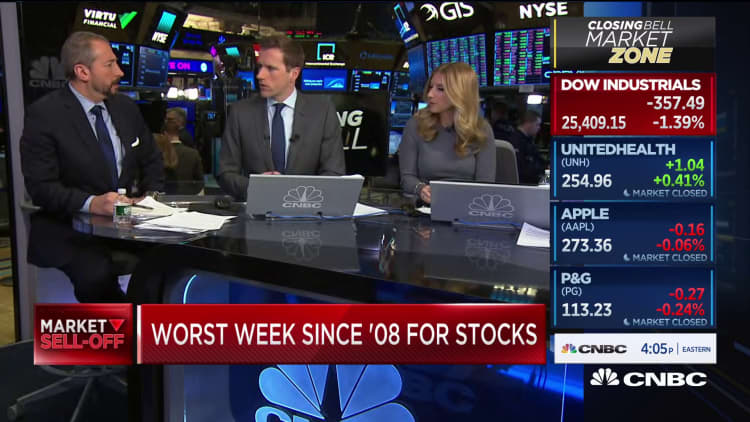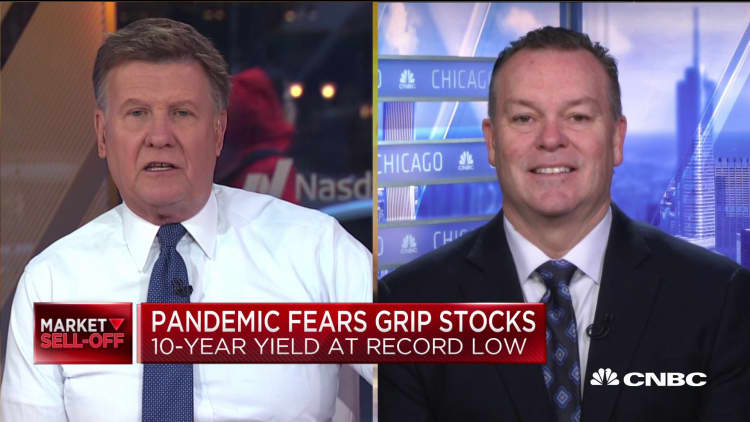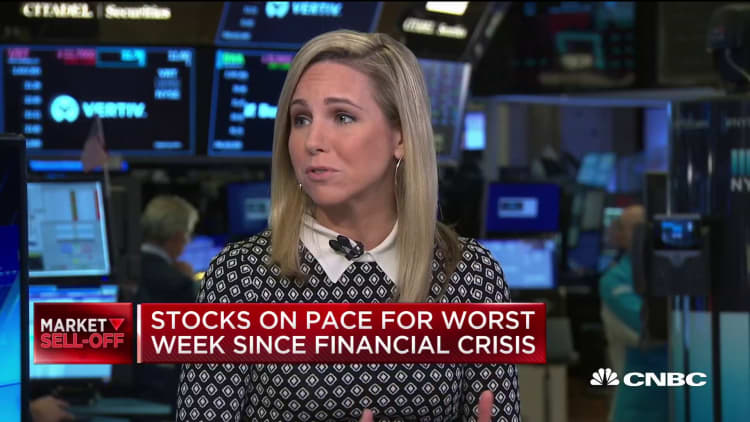In a market that raced to its fastest correction in history and the worst week since the financial crisis, it's easy to imagine a frantic dash for the exits in which everyone is selling everything at whatever price they can get.
That's not, however, what market veterans have seen this week.
Instead, they describe market trading volume about where it should be. Orders are getting filled though spreads are wide between what sellers are asking and what buyers are willing to pay. Retail clients have been largely calm, even amid a fusillade of red breathtaking in its speed and indiscriminate in its direction as virtually all areas of the stock market are getting smashed.
There was no prevailing consensus over whether the selling was justified, but rather the idea that momentum and machines have seized the moment, and this, too, shall pass.

"We let the high-frequency traders basically take over the market, and that's what it is. You just have to deal with it," said Michael Cohn, chief market strategist at Atlantis Asset Management. "It's short and quick, not painful and long. I've gotten zero calls from clients this week. The fact is, the public hasn't even panicked at all."
"It's been incredibly orderly," JJ Kinahan, chief market strategist at TD Ameritrade, told CNBC. "For those with 401(k)s and long-term positions, this is a blip on the radar. If you're nervous, look how you've done for the last two to three years."
Current market conditions this week, though, suggest something other than an orderly sell-off.
Friday added yet another chapter in what has been a miserable week. A choppy day of trading saw the Dow Jones Industrial Average lose more than 1,100 points early on, more than halve those losses in the afternoon, then slip back toward a steeper decline before finally finishing off 357 points for the day.
There was a plethora of theories about what was happening — programmed trading, forced selling, margin calls, commodity trading advisor funds bailing out — though investors had as little understanding about what was causing such an aggressive tumble in the market as they did about the future path of the coronavirus that had inspired much of the damage.
'Waiting for peak panic'
It wasn't just the virus that rattled investors.
Market pros cited a trail of unsettling headlines that helped trigger this week's crush: a cadre of Federal Reserve speakers offering little hope of rate reductions, the Bank of Korea declining to cut despite recession signs and market expectations, and the S&P 500 late last week breaking the barrier of trading at 19 times forward earnings, the first time that's happened in 18 years, among others.
Investors largely held their breath, hoping for the selling to exhaust itself. The lack of panic, in fact, may be a negative.
"The market is waiting for peak panic," said Quincy Krosby, chief market strategist at Prudential Financial. "It's waiting for capitulation, where it's just exhausted."
"You have to believe that with the ferocity of the selling, there are those mechanisms in there other than human selling, the software that exacerbates that selling. It has that feel," she added.
Though there may not be outright panic, there is a high level frustration.

Those looking to downplay the coronavirus threat have been comparing it to the flu, which kills 61,000 people a year compared to the coronavirus, which had resulted in 2,867 fatalities as of Friday afternoon, according to Johns Hopkins.
But the flu can be modeled because it has a long history. Things like the coronavirus present unknowns to the market that make the impact difficult to predict.
"It's Wall Street vs. a virus. Who wins?" Krosby said. "If this becomes a scare not just in the stock market and companies are forced to lay off people because of this, then you've now created another feedback loop. That's what this is, one feedback loop after another."
In such a scenario, it becomes easy to buy, but not so much to sell, a condition that drives prices progressively lower.
"Bids are definitely being bought, but I think people have gotten way too panicky, way too nervous," said Joe Saluzzi, a principal at Themis Trading. "What we're seeing is we've got normal volumes through buyers and sellers. Sellers were having it tough this morning. But it doesn't feel as bad now as it did this morning."
Investing strategy
Financial advisors and wealth managers largely tried to stay out of the loop that Krosby described.
Some spoke of using the market's superb 2019 performance and elevated valuations as an opportunity to take profits and raise cash, and now see themselves poised to find bargains.
Identifying an entry point, though, is difficult amid a slide that seems to have no discernible end.
One point of view was that the market simply was giving back some of the 30% or so gain it saw in 2019, which itself was a ricochet off the fourth-quarter correction in 2018.
"Last year was just too good. We could easily give back half of last year's gains," said Mitchell Goldberg, head of ClientFirst Strategy. "This is just a gigantic trading range that the market is in. We still haven't broken through to the bottom."
Goldberg said he is taking a back-to-basics approach with clients, telling them foremost not to try to trade this market. Clients looking to buy beaten-down stocks should consider whether they fit with larger investing goals rather than just trying to capitalize on a down moment for the market.
"Don't let stocks boss you around," he said. "Don't let the stock market dictate to you what your next move is. That's what traders do."
For those who did take profits during last year's run-up, the market could start to look inviting. But with so much uncertainty about the path of the coronavirus, clear opportunities may not come up for a while.
Federal Reserve Chairman Jerome Powell addressed the situation Friday, issuing a mid-afternoon statement in which he described the U.S. economy as "strong" but said he recognizes the threat from the virus and stands ready to act should conditions warrant.
That wasn't much for the markets, which ultimately shaved losses thanks mostly to a very late-day buying flurry.
"We're basically telling our clients to stay put. Every time the market has gone up like it did, we were building up cash," said Michael Kresh, president of Creative Wealth Management. "This is an opportunity — not necessarily an opportunity this minute, but we're starting to see very good companies being pulled down more than they should, and that's going to give us opportunities."



